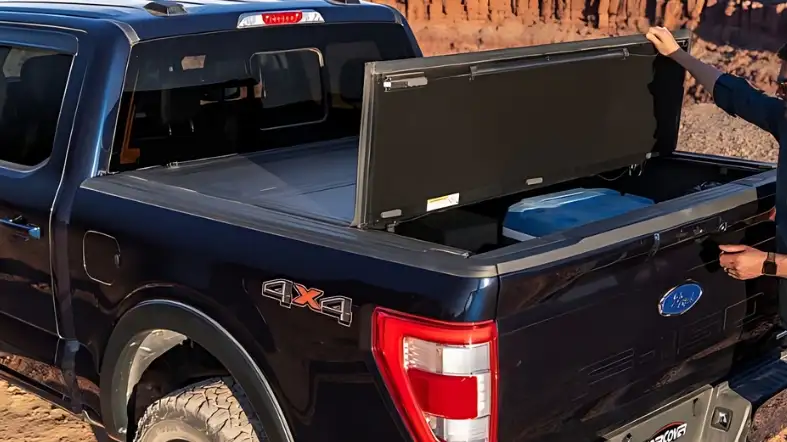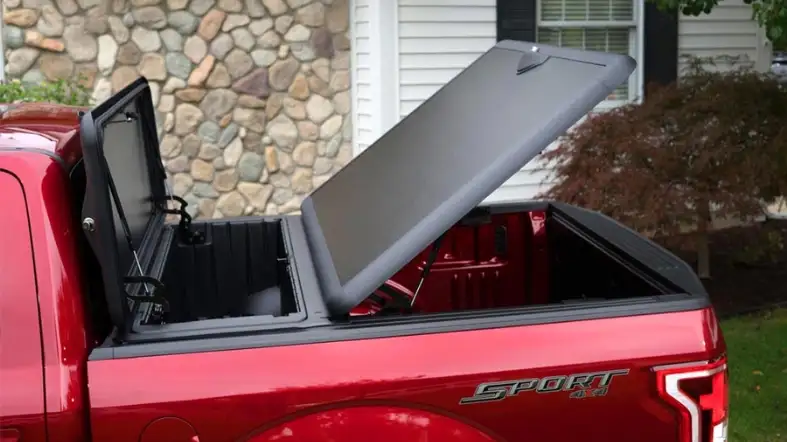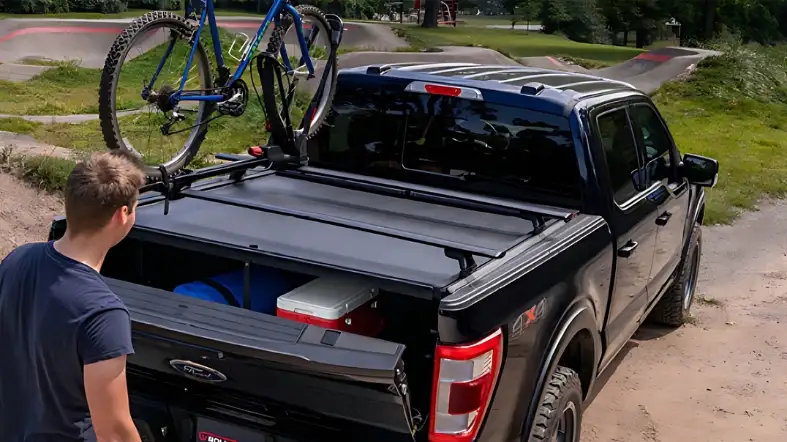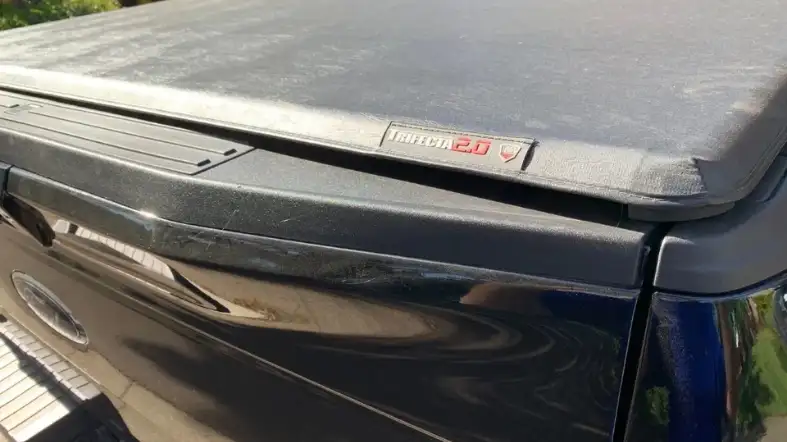Are you tired of your tonneau cover flapping in the wind? Worrying about the security of your truck bed cargo?
Securing an open tonneau cover is crucial for protecting your belongings and ensuring a smooth and worry-free ride.
In this article, we will guide you through the essential steps to properly secure your tonneau cover.
We will also explore the benefits, and provide expert tips on choosing the right security accessories. Get ready to discover how to keep your tonneau cover in place!

How Do You Secure An Open Tonneau Cover?
Here’s how you can secure an open tonneau cover:
Step 1: Assess the Latching Mechanism
Inspect your tonneau cover’s latching mechanism to ensure it is functioning properly. Check for any loose or damaged parts that may hinder secure closure.
Step 2: Clean and Prepare the Truck Bed
Thoroughly clean the truck bed surface to remove dirt, debris, and moisture. This will provide a clean and optimal surface for securing the tonneau cover.
Step 3: Position the Cover
Place the tonneau cover onto the truck bed, aligning it properly with the bed’s edges. Ensure a snug fit to prevent any gaps that could compromise security.
Step 4: Secure the Clamps or Fasteners
Depending on the type of tonneau cover you have, secure it using clamps or fasteners provided with the cover.
Follow the manufacturer’s instructions carefully for the specific securing method.
Step 5: Adjust the Tension or Straps
If your tonneau cover has tension adjusters or straps, make any necessary adjustments to ensure a tight and secure fit.
This will prevent the cover from shifting or coming loose while driving.
Step 6: Test the Security
Before hitting the road, give the tonneau cover a firm tug to check its stability. Ensure that it is securely latched and won’t come undone during your journey.
Step 7: Consider Additional Security
Accessories For added protection, consider investing in tonneau cover security accessories such as tailgate locks, locking clamps, or cable locks.
These accessories can provide an extra layer of security against theft.
Different Methods of Securing Tonneau Covers

When comparing different methods of securing tonneau covers, consider factors with your specific tonneau cover design:
Method 1: Clamping Systems
Clamping systems are a common method used to secure tonneau covers. These systems typically involve adjustable clamps that attach the cover to the truck bed rails.
They provide a secure and reliable connection, keeping the cover firmly in place.
Clamping systems are known for their ease of installation and versatility, as they can be compatible with various tonneau cover designs.
Method 2: Velcro or Hook-and-Loop Strips
Some tonneau covers utilize Velcro or hook-and-loop strips as a securing method.
These strips are often attached to the edges of the cover and adhere to the truck bed rails when closed.
While this method can be quick and convenient, it may not offer the same level of security as clamping systems.
Velcro or hook-and-loop strips may be more susceptible to wear and tear over time, potentially affecting the overall effectiveness of the cover.
Method 3: Roll-Up Tension Systems
Roll-up tonneau covers often incorporate a roll-up tension system to secure the cover.
This system typically involves built-in crossbars or adjustable tensioners that allow you to tighten the cover and keep it in place.
Roll-up tension systems offer a balance between convenience and security, as they provide a secure fit while still allowing easy access to the truck bed when needed.
Method 4: Locking Mechanisms
For enhanced security, some tonneau covers come with integrated locking mechanisms.
These mechanisms typically involve a lock or latch that secures the cover to the truck bed, preventing unauthorized access.
Locking mechanisms provide an extra layer of protection, particularly for valuable cargo or when the truck is left unattended.
However, it’s important to ensure the quality and durability of the locking mechanism for long-term effectiveness.
Method 5: Hybrid Systems
Certain tonneau covers combine multiple securing methods to offer a hybrid system.
For example, a cover may utilize clamping systems for general securing purposes, while also incorporating a locking mechanism for added security.
Hybrid systems aim to provide the benefits of different methods, allowing for flexibility, convenience, and enhanced protection.
What are the benefits of securing your Tonneau cover?

Securing your tonneau cover offers a range of benefits:
Prevent Theft and Unauthorized Access to Your Cargo
By securely latching and fastening your tonneau cover, you create a barrier that deters thieves and prevents easy access to your truck bed cargo.
This adds an extra layer of security, safeguarding your valuable belongings.
Protect Your Cargo from Weather Elements
Securing your tonneau cover tightly helps keep rain, snow, and other weather elements out of your truck bed.
By preventing moisture from entering, you shield your cargo from potential damage and maintain its integrity.
Maintain the Aesthetic Appeal of Your Truck Bed
A properly secured tonneau cover adds a sleek and clean look to your truck bed.
It creates a streamlined appearance, enhancing the overall aesthetic appeal of your vehicle and contributing to its visual appeal.
Reduce Wind Resistance and Improve Fuel Efficiency
When your tonneau cover is securely fastened, it reduces wind resistance as you drive.
This aerodynamic advantage helps improve fuel efficiency by minimizing drag and optimizing airflow over your truck bed.
Minimize Debris Accumulation and Easy Cleanup
A securely closed tonneau cover helps keep dirt, leaves, and other debris from accumulating in your truck bed.
This saves you time and effort when it comes to cleaning and maintaining the cleanliness of your cargo area.
Protect Your Cargo from UV Exposure
Exposure to sunlight and UV rays can cause damage and fading to your cargo.
By securing your tonneau cover, you shield your belongings from harmful UV rays, preserving their quality and extending their lifespan.
Maintain Privacy and Conceal
Valuables Securing your tonneau cover adds an extra level of privacy by concealing your truck bed contents from prying eyes.
It keeps your valuable items out of sight, reducing the risk of theft or unwanted attention.Step 8:
Ensure a Smooth and Quiet Ride
A properly secured tonneau cover minimizes vibrations, flapping, and noise while driving.
This creates a more enjoyable and comfortable experience for you and your passengers, enhancing the overall ride quality.
What are the risks while securing an open tonneau cover?

By being aware of these risks and taking the necessary precautions, you can secure your open tonneau cover safely and minimize any potential hazards.
Pinching Hazards
When securing your open tonneau cover, be cautious of potential pinching hazards.
Pay close attention to your fingers and hands to avoid getting them caught between the cover and the truck bed or any moving parts during the securing process.
Improper Alignment and Fit
One risk to be aware of is improper alignment and fit of the tonneau cover.
If the cover is not positioned correctly or if there are gaps between the cover and the truck bed, it may compromise the overall security of the cover.
This could result in potential damage to your cargo or even loss of items during transportation.
Insufficient Fastening or Clamping
Insufficient fastening or clamping of the tonneau cover can lead to it coming loose while driving.
This can pose a risk to both your cargo and other vehicles on the road.
Ensure that the clamps or fasteners are securely tightened according to the manufacturer’s instructions to prevent any potential accidents or hazards.
Wind Resistance and Flapping
If the tonneau cover is not properly secured, it may create wind resistance and cause flapping while driving at higher speeds.
This can not only be distracting but also increase the risk of damage to the cover itself.
It’s important to secure the cover tightly to minimize these risks and maintain a smooth and safe ride.
Limited Visibility
Depending on the design and type of tonneau cover you have, securing it may limit your visibility through the rearview mirror.
This can affect your ability to see vehicles or obstacles behind you.
Adjust your driving habits accordingly and make use of other mirrors and blind-spot monitoring systems to compensate for any reduced visibility.
Water Accumulation and Leakage
If the tonneau cover is not properly sealed or if there are gaps in its installation, water may accumulate on top of the cover or leak into the truck bed during rainy conditions.
This can lead to potential water damage to your cargo or other items in the truck bed. Ensure a secure and watertight seal to mitigate these risks.
Maintenance and Wear
Over time, tonneau covers may experience wear and tear, potentially affecting their security. Regularly inspect the cover for any signs of damage, loose parts, or degradation of the securing mechanisms.
Promptly address any maintenance or repair needs to maintain the cover’s effectiveness and minimize risks associated with compromised security
What is the Proper Tightness for Clamps on a Tonneau Cover?
Proper tightness of clamps for tonneau cover is crucial for its effective usage. When securing the cover, ensure the clamps are tightened adequately, providing a secure fit without overtightening. This balance prevents water leakage, maintains cover integrity, and protects cargo. Regularly check and adjust the clamps for tonneau cover tightness to ensure optimal performance and longevity.
FAQs
Can I Use Any Clamps Or Fasteners To Secure My Tonneau Cover?
It is recommended to use the clamps or fasteners specifically designed for your tonneau cover model.
Follow the manufacturer’s instructions for the correct type and installation method to ensure a secure fit.
Are There Any Additional Accessories I Can Use To Enhance Tonneau Cover Security?
Yes, there are additional accessories available to enhance tonneau cover security, such as tailgate locks, locking clamps, or cable locks.
These accessories provide extra layers of protection against theft and unauthorized access.
Can I Secure My Tonneau Cover With Just Velcro Or Hook-And-Loop Strips?
While Velcro or hook-and-loop strips can be used to secure tonneau covers, they may not offer the same level of security as clamping systems or other methods.
Consider the specific requirements of your tonneau cover and choose a securing method that provides the desired level of security.
Can I Secure My Tonneau Cover Without Drilling Or Modifying My Truck Bed?
Yes, many tonneau covers can be securely installed without the need for drilling or modifying the truck bed.
Look for covers that offer easy installation and compatibility with your specific truck model to achieve a secure fit without any permanent alterations.
Final Words
Secure your open tonneau cover with confidence by following the essential steps outlined in this guide.
By assessing the latching mechanism, properly positioning the cover, and securing it with clamps or fasteners, you can protect your cargo from risks such as theft, weather damage, and wind resistance.
Regular inspections and consideration of additional security accessories ensure long-lasting peace of mind. Safeguard your truck bed with a secure tonneau cover and enjoy worry-free travel.
